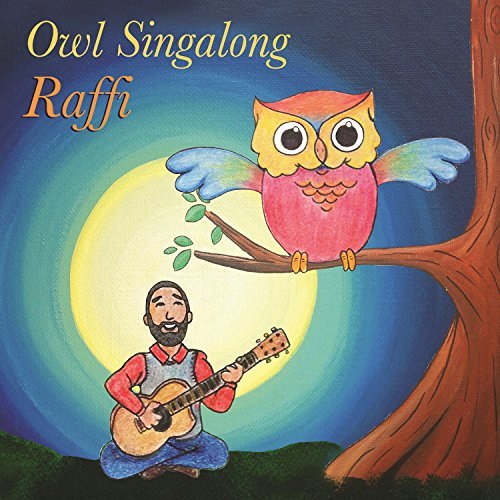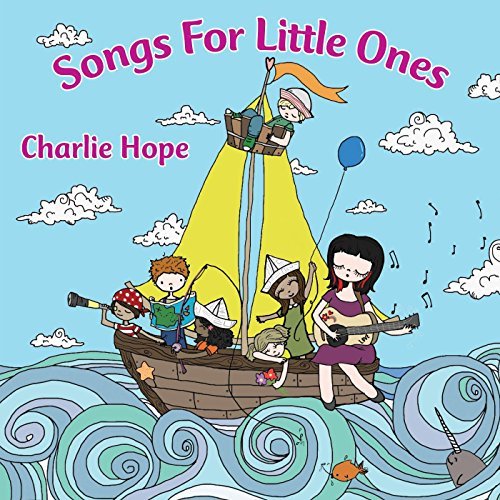Walter Martin’s singing voice is heartfelt and mostly in tune but hardly mellifluous. Martin knows this -- on “Hey Matt,” off his new album My Kinda Music, he jokes with Matt Berninger of The National about how he “love[s] writing songs but… can’t sing.” On the title track, he notes “This is how I sing / If you think I’m kidding I’m not,” joining a line of proudly defiant non-crooners like Eddie Argos of Art Brut (“yes, this is my singing voice”). He has a “shaky voice” (“The Wishing Well”) and sings “kinda funny” (“Hey Sister,” from 2014’s We’re All Young Together). Is Martin a better singer than I am? Probably. But the gap isn’t that wide. (Which is fine, because not everyone can sing like Bruno Mars or Raffi.)
Perhaps this is a case of making the subtext of an artist “finding his voice” no longer subtext. My Kinda Music is unusual for music in the orbit of “kids music” because it’s as much about the experience of Walter Martin’s childhood and his family as it is about childhood and family generally.
Martin's first solo record after years in the indie-rock band The Walkmen, 2014's We're All Young Together, featured a number of songs about animals; only a couple songs dealt concretely with the personal. And as odd as its dreamy tone and lyrics sounded amidst the rest of the "kindie" world, it was recognizable as a "kids music" album. But even as Martin sounded confident about his songwriting instincts for the album back then, this new album is an evolution in subject matter.
On My Kinda Music, Martin sings even more from a personal perspective. He often spins those personal stories into something universal -- on “Family Tree” Martin traces his family’s path from his “Great Great Great Great Grandaddy” who emigrated here from across the ocean down through generations and around the United States all the way through him, both on the East Coast. Presumably it’s entirely true, but even if it’s not, the John Hodgman line that “specificity is the soul of narrative” applies here.
But the songs are about Martin -- or at least Martin as narrator -- “Trip on a Ship” recounts falling in love with someone who appears to be his peer, not child. “Child, The Man Said” features a parental narrator who tells a brief story about a girl named “Clementine” (she moves to New Orleans instead of drowning in the river as in the old folk tune) -- it’s sung in the third person, and Martin is clearly identifying with the parent, not the child. The shambling arrangements and loose rock sound feel scrapbook-like, hand-arranged.
Even the songs that feature a perspective attuned more to the child feel more like Martin’s memories (or embellished fabrications) of his own experiences. “The Everglades” recounts a driving to “Flo-ri-dar” and while it starts out with a happy singalong chorus encouraging people to sing “Hey Ho!” it gradually becomes something spooky. (It’s the best non-Halloween song for Halloween I’ve heard in some time.) And when he inhabits the child’s perspective, his tone is that of a 40-year-old child -- on “Marco Polo,” Martin sings that “Dad’s game are really no fun / But I play along ‘cause I’m a good son.” It’s an eye roll that your 11-year-old has probably done more than once (this week), but an eye roll that you almost never hear in this musical context. And that’s nothing compared “Where’d You Go Uncle Joe?,” a shuffling rocker that includes the line “What’s it like, Uncle Mike, to lose all your hair by 25?” as Martin’s narrator proceeds to cast aspersions on a wide variety of family relations.
In many ways, this album is closer in spirit to the non-kids album between this one and We’re All Young Together, 2016’s Arts & Leisure. Arts & Leisure focused on artists, but that focus was often viewed through the prism of Martin and growing up. “Jobs I Had Before I Got Rich & Famous” paints Martin’s early adulthood as a series of less-than-edifying short-term jobs, culminating in a glimpse of Billy Joel in the Metropolitan Museum’s Cloisters museum that inspires him to become a musician. “Old as Hell” is a depressing tale in which Martin recounts bar fights and hopes to eke out a few more years before he dies -- this is not a kids song -- but “Watson and the Shark,” about being inspired by John Singleton Copley’s “Watson and the Shark” during a family outing to the National Museum of Art (“a stroll through the galleries and a decent but overpriced lunch in the cafeteria”), would slide in easily amidst the other stories of youth on My Kinda Music.
What this album does do is point to the limitations of the term “kids music.” This is an album that is kid-friendly (though I’d be a little worried about the kid younger than 12 who took to the acerbic “Where’d You Go Uncle Joe?”). But the songs about childhood are more about childhood viewed through the hazy mists of parental memory.
The term "kids music" was essentially created by the retail music industry to organize the many albums produced in the wake of Raffi's tremendous mid-70s success. The "genre" by itself doesn't imply a specific musical approach, but for the remainder of the twentieth century, "kids music" was generally synonymous with folk music -- thanks in large part to Raffi's outsized influence building upon the critical work of Pete Seeger, Ella Jenkins, and others, many on the Smithsonian Folkways label. Maybe it was a folk-pop hybrid, or into the '80s, a slightly slicker (or cheesier, depending on your tastes) approach. Beyond that, it took as given that the music was created specifically for kids, no parental input or participation necessary.
Now, I think I would be among the first to argue that our society could generally value artistic endeavors for kids more than it does. (I'd also be among the first to argue that Raffi was and continues to be a stone-cold genius.) But this focus on audience to the exclusion of style and the subsequent flood of Raffi compatriots and imitators led to, from my perspective, a cramped view of what music played for kids could sound like, both musically and lyrically. And while I can see what organizing music towards audiences rather than subject matter or sound might look like -- scrolling through iTunes or Spotify to find the latest releases in "soccer mom" or "retiree" or "stoner" -- that seems too limiting. Organizing music by an approach which could include subject matter in some manner -- think emo -- at least cracks open some genres to wider audiences, including those whose ages haven't reach double digits.
Martin isn’t the first artist to write songs that play around the edges of the term “kids music” -- other artists like Dan Zanes have recorded “all ages” music which didn’t focus on kid topics like brushing teeth or learning to count. In many ways, those attempts are an update of what Pete Seeger did a half-century ago. And other artists like Justin Roberts and Vered (who actually appears in the chorus on the opening track "The Wishing Well") who have a somewhat more familiar kids music sound write songs that occasionally come far closer to the parent perspective than the child's on the parent-child spectrum. But the closest analogue to this most dad-like of albums is, perhaps surprisingly, an album from one of kindie’s strongest female voices.
Back in 2012 Lunch Money’s Spicy Kid offered the listener songs about parenthood and was probably even more adult-focused (albeit more kid-friendly) than Martin’s album. Lunch Money’s Molly Ledford is every bit as personal a songwriter as Martin, and Spicy Kid provides an intimate look at the emotional terrain of parenthood, particularly the life of parenting inquisitive and exhausting kids. Spicy Kid strikes a balance between the adult-aimed and kid-aimed tracks better My Kinda Music does, but I do think Martin would recognize what Ledford is aiming at in her songs.
I don't think My Kinda Music is a particularly good kids music album -- I doubt a kid on their own would gravitate to the album -- though I don't think that's Martin's primary concern. But it is an excellent and kid-friendly album about parenthood and childhood, honest and occasionally sarcastic but mostly tender. And while I'm not arguing that what the world needs most is an album, aimed at parents and kids, about parenthood and childhood by a middle-aged white guy (writes the middle-aged white guy on a website that's spent more than a decade interested in those subjects), I do think that Martin finding his voice, this particular and idiosyncratic voice, is another sign of maturity for what music for kids and families can be. More voices and sounds like Martin's (and Ledford's, and many others), even if they don't sound like Raffi, to suggest other ways of hearing childhood, please.
Photo credits: Sebastian Kim, Matt Barrick























